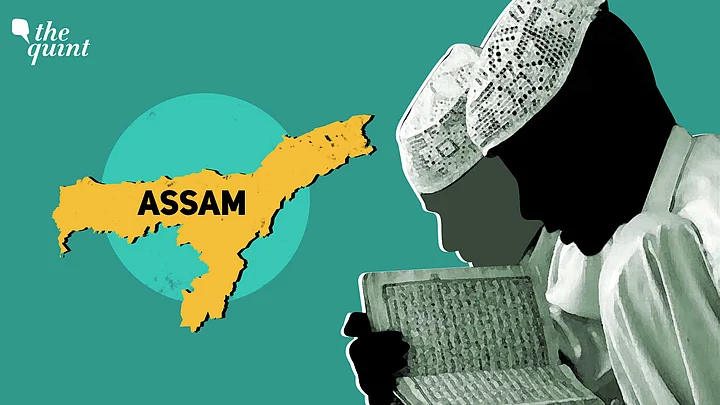When the Assam government passed a bill to abolish all the state-run madrasas and Sanskrit tols in the state with serious objection from the opposition parties in the assembly, the state's Education Minister Himanta Biswa Sarma said the intent was only to 'secularise' education.
While arguing that the government “cannot allow teaching religious education with public money”, a government note also emphasised that they would convert 97 Sanskrit tols in the state.
These Sanskrit places of learning would be turned into research centres to ‘teach Indian civilisation’ under Kumar Bhaskar Varma Sanskrit and the Ancient Studies University.
A Bid To ‘Save’ Assamese Culture & Civilisation
Opposition parties like the Congress and Badruddin Ajmal's All Indian United Democratic Front (AIUDF) questioned the government's intent by alleging that the bill would polarise Assam ahead of the 2021 assembly elections.
They are right to be apprehensive of such a move as minister Sarma had earlier declared that the upcoming elections would seen as a battle to save Assam’s ‘culture & civilisation’.
According to the 2011 Census, Hindus account for around 61.47 percent of Assam’s population, while Muslims stand at about 34.22 percent. Referring to the state’s demography, Sarma had said the 60-plus majority would ‘together fight against this culture-civilisation notion’.
Muslims are often accused by the Bharatiya Janata Party (BJP) — to which Himanta Biswa Sarma belongs — for bringing in ‘alien’ Islamic culture into the state.
Why Does BJP View Madrasas With Suspicion?
Madrasas, be they state-run or self-funded local Islamic seminaries, have always remained the ‘favourite target’ of BJP leaders since the party's inception. They have been regularly terming madrasas as ‘hotbeds of terrorism’, without any basis and verifiable facts.
The patriotism in the madrasa attendees is always ‘suspect,’ — we have seen the UP government under Yogi Adityanath giving special instructions to such institutions to hoist the national flag on Independence Day.
However, we rarely see such public statements concerning the Sangh Parivar’s educational institutions like Ekal Abhiyan or Vidya Bharati.
‘Secularism Alibi Falls Flat’
The motive behind such biased attitudes lies in the Sangh’s ideology, where every Hindu is a de-facto Indian. For the Sangh, however, this does not apply to a Muslim, whose nationalism can be questioned at every step.
Even with this recent decision, the Assam government’s argument about ‘promoting secularism’ falls flat because it upgrades Sanskrit tols by bringing them under a university — while state-run madrasas are totally disbanded.
Some scholars have linked this move with the broader Indological project associated with the New Education Policy (NEP 2020), which strives to promote ancient Hindu civilisation as being the foundation of the idea of India.
Another issue associated with madrasas is the aspect of 'modernisation', which has always been discussed in government corridors. Though the Justice Rajinder Sachar Committee busted the myth that most Muslim kids get their education in local madrasas (only 4 percent do, the Committee had said), the idea to mainstream and modernise these institutions had remained in use only to 'otherise' the minority community.
This has been done by both the ruling party and so-called ‘secular’ parties who failed to provide basic educational services in Muslim-dominated areas. Himanta Biswa Sarma has already announced a separate bill to regulate and modernise private madrasas as well.
Why Assam Govt’s Decision On State-Run Madrasas Can’t Be Seen In Isolation
In recent times, the Vishva Hindu Parishad and other Hindu outfits have ramped up their campaigns to amend Article 29 and 30 of the Indian Constitution, which allows minorities to protect their culture and language and enjoy the right to establish and administer educational institutions of their choice.
The presence of both these articles in the Indian Constitution has often been analysed by the Hindu right as explicit ‘policies of appeasement’ to minority communities.
Former Prime Minister Atal Bihari Vajpayee also demanded that Article 30 should be extended to Hindus as well.
Relying on these laws, Muslim outfits in Assam are considering legal challenges to this recent decision taken by the Assam government. Such cases would raise many constitutional issues which are already being debated in the highest court of India.
Though the Modi government has not taken any direct step to amend Article 29 or 30, in the recent past, they have challenged the minority character of Aligarh Muslim University in the Supreme Court, citing ‘central aid’ to these academic institutions.
Overall, the Assam government’s decision cannot be seen in isolation.
The decision has to be studied in light of the complex history of attacks on minority rights in India. Be it ‘secularism’ or the aim to ‘modernise’ madrasas, the decision appears to be only a façade.
(Adil Hossain, D Phil (University of Oxford), is Founder & Editor-in-Chief of Khurpi. He is also a Commonwealth Scholar. He tweets @adilhossain. This is an opinion piece, and the views expressed are the author’s own. The Quint neither endorses nor is responsible for them.)
